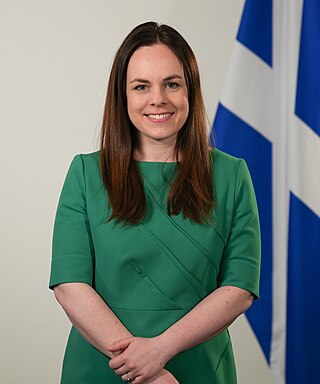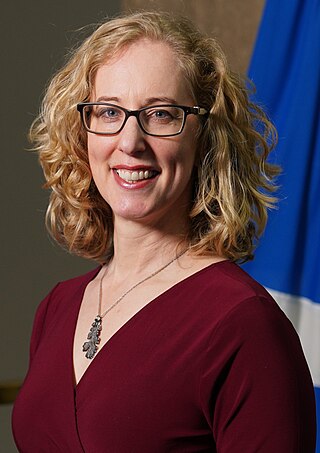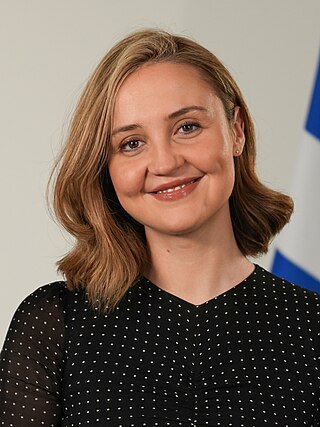
The politics of Scotland operate within the constitution of the United Kingdom, of which Scotland is a country. Scotland is a democracy, being represented in both the Scottish Parliament and the Parliament of the United Kingdom since the Scotland Act 1998. Most executive power is exercised by the Scottish Government, led by the First Minister of Scotland, the head of government in a multi-party system. The judiciary of Scotland, dealing with Scots law, is independent of the legislature and the Scottish Government. Scots law is primarily determined by the Scottish Parliament. The Scottish Government shares some executive powers with the Scotland Office, a British government department led by the Secretary of State for Scotland.

The Scottish Government is the devolved government of Scotland. It was formed in 1999 as the Scottish Executive following the 1997 referendum on Scottish devolution. Its areas for responsibility of decision making and domestic policy in the country include the economy, education, healthcare, justice and the legal system, rural affairs, housing, the crown estate, the environment, the fire service, equal opportunities, the transportation network, and tax, amongst others.

Shona McRory Robison is a Scottish politician who has served as Cabinet Secretary for Finance and Local Government since 2023. A member of the Scottish National Party (SNP), she previously served as Deputy First Minister of Scotland from 2023 to 2024. Robison has been the Member of the Scottish Parliament (MSP) for Dundee City East since 2003 and was an additional member for the North East Scotland region from 1999 to 2003.

Bute House is the official residence of the First Minister of Scotland and Keeper of the Great Seal of Scotland, located within Charlotte Square in Edinburgh. Alongside two other personal offices at the Scottish Parliament Building and St. Andrew's House, Bute House also contains a smaller office used by the First Minister when in official residence.

The Deputy First Minister of Scotland is the second highest ranking minister of the Government of Scotland, behind the First Minister.

Patrick Harvie is a Scottish politician who served as Minister for Zero Carbon Buildings, Active Travel and Tenants' Rights from 2021 to 2024. He has served as one of two co-leaders of the Scottish Greens since 2008, and is one of the first Green politicians in the UK to serve as a government minister. Harvie has been a Member of the Scottish Parliament (MSP) for the Glasgow region since 2003.

Scottish republicanism is an ideology based on the belief that Scotland should be a republic; the nation is currently a monarchy as part of the United Kingdom. Republicanism is associated with Scottish nationalism and the Scottish independence movement, but also with British republicanism and the movement for federalism in the United Kingdom.

The Scottish Government Economy Directorates are a group of Directorates of the Scottish Government. They were rebranded as the Economy Directorates in July 2016, having previously been reorganised in December 2010 and then in June 2014. In July 2021, a further re-organisation led to the creation of the Net Zero Directorates, with Agriculture & Rural Economy, Marine Scotland, Energy & Climate Change, Environment & Forestry, Transport Scotland, Forestry and Land Scotland and Scottish Forestry moving to the new Directorate General.

The Minister for Employment and Investment, commonly referred to as the Employment Minister is a junior ministerial post in the Scottish Government. As a result, the Minister does not attend the Scottish Cabinet. The incumbent reports to the Cabinet Secretary for Economy and Gaelic.

The Minister for Environment, Biodiversity and Land Reform was a junior ministerial post in the Scottish Government. As a result, the Minister did not attend the Scottish Cabinet, but supported the Cabinet Secretary for Net Zero, Energy and Transport who continues to attend the cabinet.

Lorna Slater is a Canadian-born Scottish politician, who served as Minister for Green Skills, Circular Economy and Biodiversity in the Scottish Government from 2021 to 2024.

Màiri Louise McAllan is a Scottish politician serving as Cabinet Secretary for Net Zero and Energy since 2024. She previously served as Cabinet Secretary for Transport, Net Zero and Just Transition from 2023 to 2024 and Minister for Environment, Biodiversity and Land Reform from 2021 to 2023. A member of the Scottish National Party (SNP), she has been the Member of the Scottish Parliament (MSP) for Clydesdale since 2021. McAllan is a former corporate solicitor, who also served as a special advisor to First Minister Nicola Sturgeon prior to her election to the Scottish Parliament.

Nicola Sturgeon formed the third Sturgeon government following her Scottish National Party's victory in the 2021 Scottish Parliament election. Sturgeon was nominated by a vote of the 6th Scottish Parliament for appointment to the post of First Minister on 18 May 2021 and announced the formation of a new Scottish National Party minority government on 19 May.

The Bute House Agreement, officially the Cooperation Agreement between the Scottish Government and the Scottish Green Party Parliamentary Group was a power-sharing agreement between the Scottish National Party (SNP) government and the Scottish Greens which was agreed in August 2021 to support the Third Sturgeon government and then was reaffirmed to support the First Yousaf government.

The Minister for Zero Carbon Buildings, Active Travel and Tenants’ Rights was a junior ministerial post in the Scottish Government. As a result, the minister did not attend the Scottish Cabinet but reported directly to the First Minister of Scotland. The only individual who held the post was Patrick Harvie, who was appointed in August 2021 after the Bute House Agreement.

The Scottish Government Net Zero Directorates are a group of Directorates of the Scottish Government. The group was created in July 2021, with Agriculture & Rural Economy, Marine, Energy & Climate Change, Environment & Forestry, Transport Scotland, Forestry and Land Scotland and Scottish Forestry moving from the Economy Directorates.

Humza Yousaf formed the first Yousaf government on 29 March 2023 following his appointment as first minister of Scotland at the Court of Session. It followed the resignation of Nicola Sturgeon as first minister and leader of the Scottish National Party (SNP) on 15 February, triggering a leadership contest that Yousaf won.

Humza Yousaf formed the Second Yousaf government on 25 April 2024 following his dissolution of the Scottish National Party's power sharing agreement with the Scottish Greens. This resulted in a government crisis, where Yousaf faced the threat of a vote of no confidence now that the SNP was leading a minority government. Days later, Yousaf announced his intention to resign as First Minister and leader of the SNP. John Swinney succeeded Yousaf on 7 May 2024 following a leadership election.

In April 2024, Humza Yousaf, first minister of Scotland and leader of the Scottish National Party (SNP), faced a confidence challenge following his termination of the Bute House Agreement between the SNP and the Scottish Greens, which meant that Patrick Harvie and Lorna Slater, co-leaders of the Greens and their only government ministers, were removed from government. This was following changes to landmark climate policy by Cabinet Secretary for Wellbeing Economy, Net Zero and Energy Màiri McAllan, after which a planned Greens vote on the continuation of the agreement was announced. Facing a motion of confidence in him Yousaf announced his intention to resign as first minister and party leader on 29 April.

John Swinney's term as First Minister of Scotland began on 8 May 2024, when he was formally sworn into office at the Court of Session, upon Humza Yousaf's resignation.

















